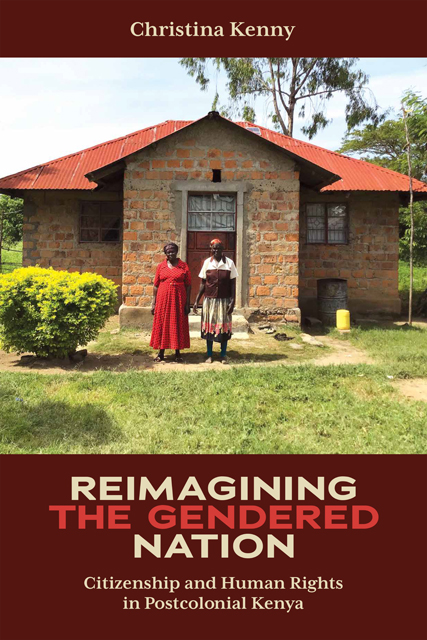Book contents
- Frontmatter
- Dedication
- Contents
- List of Illustrations
- Acknowledgements
- Note on Ethnic Identities
- List of Abbreviations
- Introduction
- 1 The Kenya Colony in British East Africa: A History of Ethno-patriarchy
- 2 Bodies as Battlefields, Bodies as Weapons: The Colonial Regulation of Women’s Bodies
- 3 Myths of Sorority: Kenyan Women’s Community Organisation
- 4 Everyday Violence: Violence against Women during Elections and Times of Peace
- 5 Gendered Citizenship, Politics and Public Space: Women’s Participation in Government
- Conclusion
- Appendix: Field Work, Focus Groups and Interviews
- Bibliography
- Index
- Eastern Africa Series
Conclusion
Published online by Cambridge University Press: 17 December 2022
- Frontmatter
- Dedication
- Contents
- List of Illustrations
- Acknowledgements
- Note on Ethnic Identities
- List of Abbreviations
- Introduction
- 1 The Kenya Colony in British East Africa: A History of Ethno-patriarchy
- 2 Bodies as Battlefields, Bodies as Weapons: The Colonial Regulation of Women’s Bodies
- 3 Myths of Sorority: Kenyan Women’s Community Organisation
- 4 Everyday Violence: Violence against Women during Elections and Times of Peace
- 5 Gendered Citizenship, Politics and Public Space: Women’s Participation in Government
- Conclusion
- Appendix: Field Work, Focus Groups and Interviews
- Bibliography
- Index
- Eastern Africa Series
Summary
‘So I will tell you a story, Maitu, Wanjiku is dead. Wanjiku was one of those strong African women you see around Nairobi with a huge load of Sukuma Wiki, onions, potatoes and lots of other food, which they sell from place to place. from place to place. You could call her a hawker, I prefer Wanjiku.’
Through this account of the sociopolitical rights of African women in Kenya, from the late colony through to the contemporary period, we have witnessed the establishment and entrenchment of colonial ethno-patriarchal politics and its insidious reproduction in the postcolonial republic. Violence against women – especially violence adjacent to and during elections – has drawn the world’s attention but, as we have seen, rather than an extraordinary deviation from an otherwise peaceful life, electoral violence is symptomatic of a wider sphere of pervasive institutional and everyday violence.
With the embodied trauma of the 2007 elections still hanging in the air, for Kenyans the 2013 elections served as a painful reminder. Friends in low voices explained to me the burnt-out shopfronts as we passed – ‘that one was a Kikuyu business’, ‘that was a Luo shop’ – or why the markets outside Valley Arcade were so makeshift – the structures of a more established market were destroyed in the 2007 violence and never rebuilt. Talk of voting in 2013 prompted stories of terror from 2007 – ‘this is how I fled’, ‘these are who were chasing me’. As much as the 2010 Constitution and the success of the 2013 elections signalled important and long overdue reform, the key power structures, cultural biases and modes of endemic corruption remained untouched. Although far from perfect, a kind of collective relief took hold in the aftermath of the 2013 elections. The fact that they were relatively peaceful, and comparatively transparent, was combined with a profound exhaustion across Kenya – the stress of remembered trauma, the skyrocketing price of necessities including cabbage, clean water, cooking oil, kerosene, charcoal and transport, and lost days of work as everyone sheltered in place until the threat of violence had passed.
The good example set by the 2013 elections was not repeated in 2017. At an estimated cost of almost US$500 million to administer, the 2017 General Elections in Kenya were the most expensive elections per capita ever to have taken place on the African continent, and the second-most expensive in the world.
- Type
- Chapter
- Information
- Reimagining the Gendered NationCitizenship and Human Rights in Postcolonial Kenya, pp. 180 - 190Publisher: Boydell & BrewerPrint publication year: 2022



